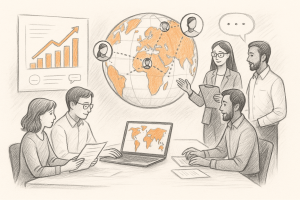Companies increasingly recognize that fostering diverse language skills within their workforce is a powerful catalyst for market expansion, enhanced customer satisfaction, and a vibrant culture of innovation. Moving beyond a monolingual mindset is crucial for organizations aiming not just to survive, but to thrive on the international stage.
The old assumption that “everyone speaks English” is a precarious foundation upon which to build a global business strategy. While English remains a significant language of international commerce, relying on it exclusively can create blind spots, missed opportunities, and a disconnect with vast segments of the global market.
Beyond borders: multilingualism as your passport to market expansion
The most direct impact of embracing multilingualism is the ability to break down geographical and cultural barriers to enter and succeed in new markets:
- Authentic local engagement: communicating with potential customers, partners, and suppliers in their native language builds immediate trust and rapport. Marketing messages resonate more deeply, sales negotiations become smoother, and contractual understanding is clearer.
- Navigating new terrains: local language skills unlock a deeper understanding of regional business etiquette, consumer behaviour, legal requirements, and competitive landscapes. This localized intelligence is invaluable for crafting effective market entry strategies.
- Unlocking untapped markets: many of the world’s fastest-growing economies are in non-English speaking regions. A multilingual team can explore and penetrate these markets far more effectively than a monolingual one.
- Building stronger local partnerships: effective communication is the bedrock of any successful partnership. Being able to converse in a partner’s native language fosters stronger, more collaborative, and more resilient business relationships.
The language of loyalty: elevating customer satisfaction
In a customer-centric world, speaking your customer’s language—literally—is a game-changer for satisfaction and loyalty:
- Personalized customer experiences: addressing customers in their preferred language throughout their journey – from initial inquiry to post-sale support – creates a more comfortable, respectful, and personalized experience.
- Culturally sensitive support: language is intrinsically linked to culture. Multilingual teams can provide support that is not only linguistically accurate but also culturally attuned, avoiding misunderstandings and building stronger connections.
- Increased accessibility and trust: when customers can easily find information and receive support in their own language, it significantly lowers barriers to engagement and builds a stronger sense of trust in your brand.
- Reduced churn and enhanced retention: feeling understood and well-served in their native language makes customers more likely to remain loyal, even when competitors offer similar products or services.
The innovation advantage: how diverse languages fuel creativity
The benefits of multilingualism extend deep into the creative and innovative core of a business:
Diverse perspectives, richer solutions: different languages often embody different ways of thinking and approaching problems. A team with diverse linguistic backgrounds brings a wider array of perspectives, leading to more creative solutions and robust decision-making.
Enhanced cognitive abilities: research suggests that multilingual individuals often exhibit enhanced cognitive flexibility, problem-solving skills, and an ability to understand different viewpoints – all vital ingredients for innovation.
Improved internal collaboration in global teams: for multinational companies, a multilingual workforce facilitates smoother internal communication, knowledge sharing, and collaboration across different offices and cultural contexts.
Access to a global talent pool: prioritizing language skills broadens your access to talented individuals from around the world, bringing in fresh ideas and specialized expertise.
Embedding multilingualism into your strategic DNA
Transforming into a truly multilingual organization requires a conscious and strategic approach:
- Assess your linguistic assets and gaps: understand the current language capabilities within your organization and identify the key languages needed to achieve your strategic business goals. It’s worth using language tests to measure the skills you need.
- Invest in language development: offer language training and development opportunities to your existing employees, empowering them to contribute in new linguistic contexts. Use personalized training to enhance engagement in learning.
- Prioritize language skills in recruitment: actively seek out and recruit talent with the specific language skills your business needs. This involves not just identifying proficiency but also the ability to use language effectively in a professional setting.
- Leverage professional language services: partner with reputable providers for translation, localization, and interpreting services.
- Foster an inclusive culture: create a workplace environment where linguistic diversity is valued, and employees feel comfortable using and developing their various language skills.
Multilingualism is not a luxury – it’s a fundamental component of a resilient, adaptive, and growth-oriented business strategy. Companies that embrace linguistic diversity will be better equipped to explore new horizons, connect authentically with their customers, and foster the innovative thinking needed to lead in their respective industries. This isn’t just about speaking different languages; it’s about unlocking a world of opportunity.
Is your business truly equipped to communicate, connect, and compete on a global scale?
Understanding and leveraging the power of language is key. Focus Audit Tool provides expert language skills audits to help you build a multilingual workforce that drives international success. We can assist you in accurately assessing the language proficiency of your teams and new hires, ensuring you have the linguistic capabilities to expand your markets, enhance customer satisfaction, and spark innovation.





